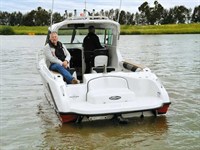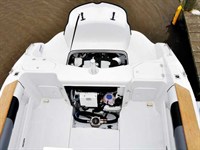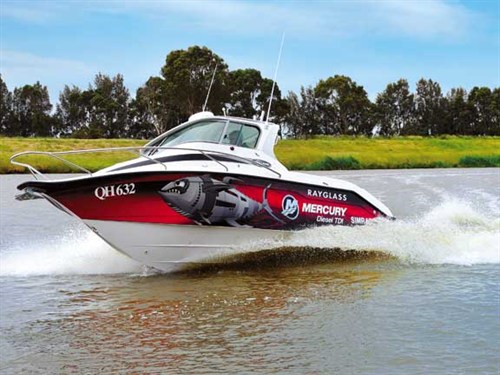Compact diesels are becoming increasingly popular in small cars and John Willis is convinced they’re now a solid proposition for trailerable boats as well.
Marine industry giant Mercury Marine has enthusiastically embraced Volkswagen’s recent compact diesel research in producing its new range of Mercury TDI diesel inboards. So I jumped at the invitation to test a 3.0L 260hp V6, fitted to a Rayglass 2350 Hard Top on a fairly wet and blustery day. Despite aching to drive one of these for quite a long time (having tested and enjoyed many of its competitors), I wasn’t expecting it to be quite this good!
Ever the professional, I was armed with very little knowledge of these engines prior to the demo. I did know they were a much-anticipated result of the latest European development combined with good old Mercury know-how, but that was about it. On arrival, I was greeted by the Mercury team and was pleased to spot a familiar face – Mark Barrow, Mercury’s sales and applications manager – a marine mechanic with an impeccable reputation and a long pedigree, whom I worked with many years ago.
But we weren’t there for a reunion, this was serious boat business. The European motor vehicle market has made gigantic advances in small diesel technology in the past decade, and those efficiencies have been trickling down to the trailerable boating market.
And that trickle has now become a flood.
The Ride
Turns out the Mercury 260 TDI V6 with a Bravo 3 leg was just what I’d been wishing for. And yep, I got that right – it’s marketed as a Mercury Diesel, not a MerCruiser. Finally, a diesel with the noise levels of a petrol inboard, exceptionally light weight, premium levels of safety, and power to burn.The Mercury TDI Diesel is a complete technological milestone.

However, my prediction is that Mercury have turned the power game on its head and you will start seeing these compact diesels fitted to many trailerable sportsfishing machines and mobile charter vessels.
Engine
Turn the key and the engine idles with a confident murmur until you plant the throttles. There’s only a microsecond of delay before the power begins to impress. Mark knew I was pleased with the performance within five seconds of planting the throttle – he saw the smile grow on my face. This is a diesel with real difference.
The acceleration is endless right through the rev range, with a number of noticeable power bands thrusting this little beauty right up to Wide Open Throttle – an impressive 38kts at 4170rpm. That’s a whisker over 70kmh or nearly 44mph for old fellas like me.
In any language, it’s more than enough top end for any offshore boat of this nature. The engine delivers maximum torque between 2000-2800rpm giving enormous confidence throughout the real working range.
The other impressive part was the fuel consumption. At 38kts the unit topped out at 54L/h, and a quick check of my records revealed that a roughly equivalent sized boat with a competitor’s 250hp four-stroke outboard used 61.5L/h at 35kts and 80L/h at 40kts.

It is also interesting to note that I found better consumption figures in practice than quoted on the Mercury spec sheet. My testing was done with two passengers and approximately 180L of fuel. We later loaded her up with five people on board and found very little difference in performance – testament to the tremendous torque of this diesel.
The weight of the unit is also a very pleasant surprise. At a low 306kg, the 260hp Mercury TDI V6 diesel is considerably lighter than the popular MerCruiser 4.3L petrol V6 that weighs in at 352kg and pushes out lesser horsepower (230hp) with lower torque.
Verdict
Now, when it comes to noise levels I’d rather talk about my experience than quote figures. The Mercury specifications tell us it achieves 70dB, which sounds very low but doesn’t define the parameters or testing conditions that resulted in this figure. What does matter to me, is that the Mercury diesel has a really satisfying note for a compact diesel. It has very little induction whistle, and a sweet turbo pitch singing away softly, yet assuredly. There’s no deep down throb or nasty harmonic. In fact, it has a precision machined, pleasing note right throughout the rev range. To me it has the acoustic attraction of hi-tech European engineering.
We took the big girl through her paces in a series of steep high speed turns and the big Bravo 3 Duo prop leg with 4/3 blade, 22in stainless props never slipped an inch. It just bit through turns, responded very well to trim and transmitted power efficiently on fast take offs. The engine revs barely dropped as we laid her over through the steep banking turns, and you could power yourself off your feet with the high-speed acceleration.
The low noise levels allowed Mark and I to catch up on the new technology with clear conversation even at high speeds – not bad, considering my dose of industrial deafness. To say I was pleased is a massive understatement, and we did it all without a hint of diesel fumes, even with a strong tail wind blowing directly into the hard top.
The Volkswagen technology now ensures the highest levels of German engineering are combined with the brute strength of Mercury’s proven drive system. The tested 260hp V6 has aluminium cylinder heads, common rail fuel injection with Piezo injectors and a whopping 180amp alternator to keep all that technology charged. It has a closed cooling system and a single geometry turbo that eliminates turbo lag and provides even power throughout the range.
Mercury TDI diesels are available in V6 and V8 models from 230hp to 370hp, and there’s also the QSD range of in-line four and six cylinder configurations from 115hp to 350hp. They all come standard with Smart Craft instruments, and in our case, it was optioned with a Vessel View seven-inch digital display which I found very easy to read in all light conditions, and simple to navigate through its multitude of functions, including more than 30 live engine parameters. You can option up again to the Digital Throttle and Shift (DTS) and even Axius joystick piloting, or maybe Axius Premier, for full interaction with autopilot, waypoint sequencing or you can stay in one place (maybe on top of that bait school or bommie) with Skyhook digital anchoring.
The Mercury team certainly taught this old dog some new tricks with their efficient, innovative and user-friendly TDI compact diesel technology. They’ve got me barking about it!
Postives
- Quiet – nice engine note
- Effortless direct power
- Through the range
- Fuel efficient
- No diesel smell or fume
- Compact
- Lightweight
Negatives
- Microsecond of delay from standing start.
For the latest reviews, subscribe to our Trade-A-Boat magazine here.
Photography: Alison Kuiter











